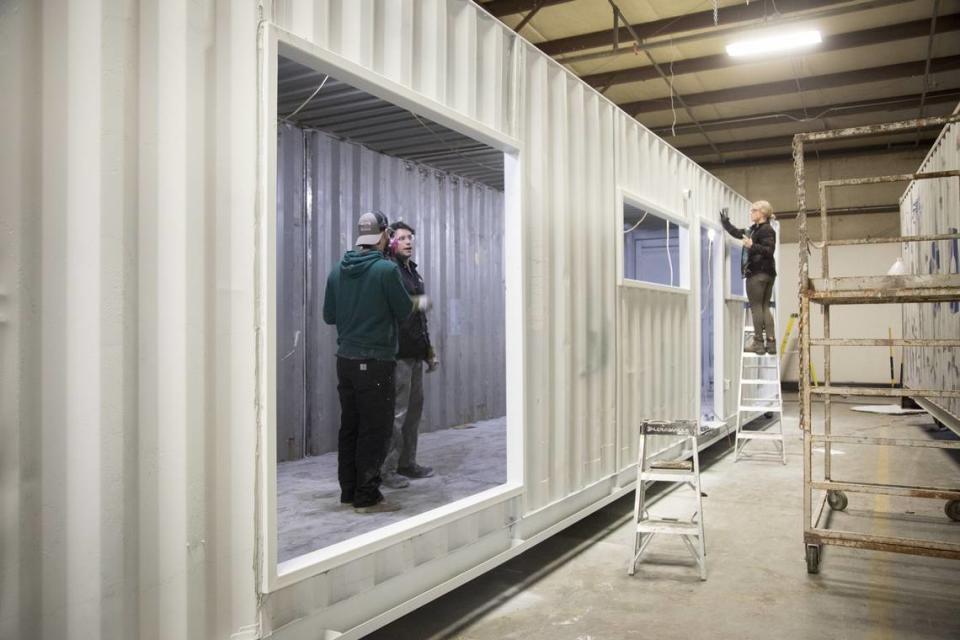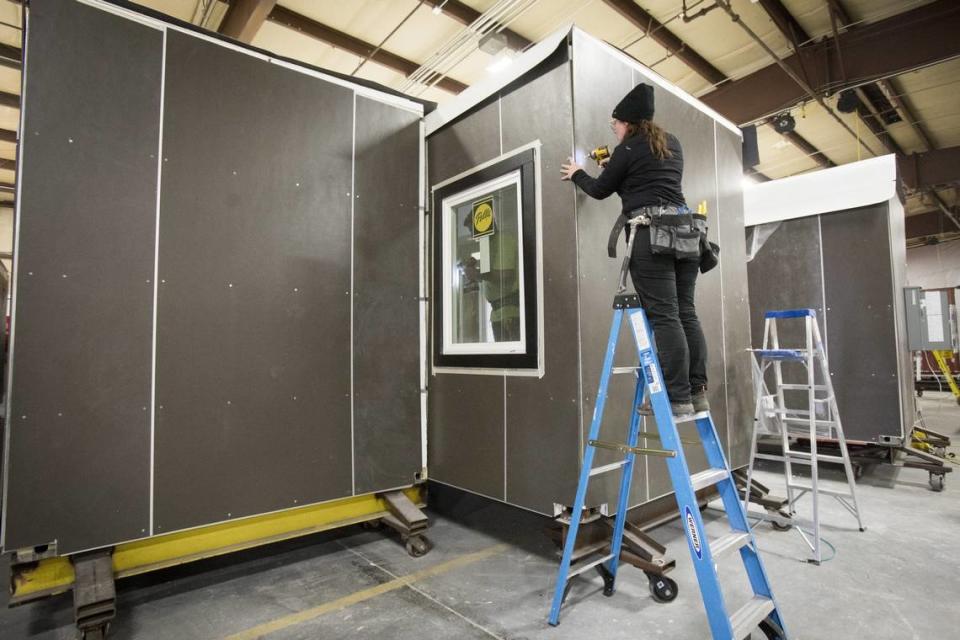Idaho company received big attention for its shipping-container homes. Then this happened
Two years ago, an Idaho home made from shipping containers was displayed at an innovative housing show within view of the Washington Monument on the National Mall in Washington, D.C.
Three months later, in August 2019, then-Housing and Urban Development Secretary Ben Carson heaped praise on the house’s manufacturer, IndieDwell, as he toured the Boise company’s factory in Caldwell.
“My expectation when I heard about container homes is that they would look like containers that somebody had painted over and put a few amenities in,” Carson told the Idaho Statesman then. “This is completely different. This is transformative, and it looks like a small site-built home. It’s been done very well and (there’s) a lot of creativity involved here.”
Now, the factory at 3520 Arthur St. sits idle, waiting to deliver the last of 14 completed three- and four-bedroom homes to Leap Housing Solutions for its Caritas Commons affordable housing project in Northwest Boise.
IndieDwell’s original Caldwell factory temporarily shut down
Sixty-one employees have been laid off, and it’s uncertain when the plant might reopen.
“I would say it’s going to be probably several months before we ramp back up,” IndieDwell co-founder and executive chairman Pete Gombert said by phone. “We also are working through the scaling of other factories at the same time, too, so there’s a lot of moving parts.”
This week, IndieDwell announced that it will invest more than $2 million to open a new factory in Newport News, Virginia. The company said the factory, expected to open next year, will employ 220 workers.
“The affordable housing deficit in Virginia and across our country has deepened amid the pandemic and IndieDwell’s innovative modular units are an important part of the solution,” Virginia Gov. Ralph Northam said in a press release.
IndieDwell also operates a factory in Pueblo, Colorado, that opened last July. It employs more than 65 workers and plans call for expanding the workforce to 200.

The closure of the Caldwell factory comes as the International Code Council, which establishes building codes and practices used throughout the world, instituted new regulations regarding the use of shipping containers.
Used containers, which IndieDwell favored because of the low cost and as a way to reuse materials that likely would be scrapped for steel, can no longer be used for housing made in factories. Single-trip containers are now mandated, Gombert said, raising the cost and defeating the purpose of recycling used containers at the end of their shipping life.
Shipping containers out, replaced by steel framing
IndieDwell will retool its factories to assemble the entire modular units for its homes out of steel framing. It will continue producing single-family homes and apartment buildings with up to six stories.
“This Caldwell shutdown was always planned as part of a conversion from our existing product line based on shipping containers into the cold-form steel product that we’re using going forward,” Gombert said.
BoiseDev.com, which first reported the factory shutdown, quoted a former IndieDwell marketing manager and spokesperson, Chris Blanchard, saying the company suffered from a lack of cash. Blanchard, who was laid off last month and declined to speak with the Idaho Statesman, told BoiseDev.com that IndieDwell “ran out of money before they ran out of month.”
Gombert denied that.
“That’s just not accurate,” Gombert said. “He said we ran out of money. We haven’t run out of money, and we’re still operating. Like I said, we just announced a new factory.”
He said IndieDwell is talking with the landlord of its Caldwell factory, looking to expand. The Caldwell factory has 21,000 square feet, compared with 100,000 square feet in Pueblo. The Virginia plant will also have 100,000 square feet, he said.
Both the Caldwell and Pueblo factories were set up to run one production line, creating and finishing a new module every nine days. Pueblo will eventually have three production lines, as will Newport News. An expansion would allow the Caldwell plant to expand to two or three lines.

IndieDwell produced its first modules in 2018, a year after the company was founded by Gombert and Scott Flynn, the company’s chief impact officer. The company has completed 27 projects and has built 150 to 200 units. Eighty-five percent were completed in Caldwell, Gombert said.
Leap Housing Solutions continues to use IndieDwell homes
IndieDwell built eight single-family homes for Leap Housing Solutions, a Boise nonprofit that works to help low-income families obtain affordable housing, on Shields Avenue in Northwest Boise. The 14 completed Caritas Commons homes awaiting shipment will be placed in the same neighborhood.
IndieDwell is also slated to build another 14 homes for Leap in the Whitney Commons project at 921 N. Shamrock St., near West Fairview Avenue and North Cloverdale Road.
“We’re working with Leap to figure out if we’re going to ramp the factory back up with their next project or if we’re going to build that project in Pueblo,” Gombert said.

